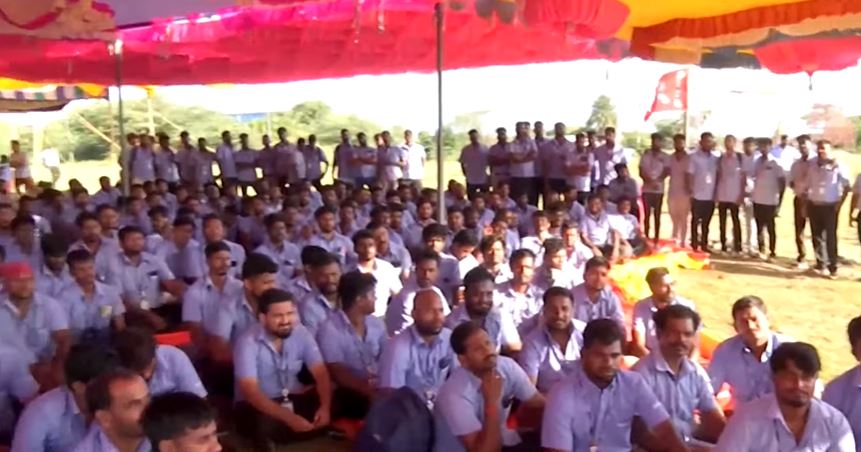Police arrest over 100 striking Samsung workers and union leaders in India
Protesting workers want higher wages, better working hours, and recognition of labour union

Police in the southern Indian state of Tamil Nadu have detained nearly 150 Samsung plant workers and union leaders for planning a protest march without permission.
Several hundred workers have been on strike protesting low wages in a makeshift tent near the Samsung Electronics plant outside the state capital of Chennai for over a week. The workers have been demanding higher wages, better working hours, and recognition of a union backed by influential labour group the Centre of Indian Trade Unions, or CITU.
The protesting workers and CITU members were detained on Monday while they were marching towards the Kanchipuram district collectorate to hand over a memorandum on the eighth day of the strike.
“It is the main area which would become totally paralysed and the protest would disturb public peace," senior Kancheepuram district police officer K Shanmugam told Reuters.
He cited the presence of schools, colleges and hospitals in the area to justify denying permission to the protest march.
“We have detained them in wedding halls as all of them can't be in stations," he added.
The Samsung protest has cast a shadow on prime minister Narendra Modi's plan to woo foreign investors to "Make in India" and triple the country’s electronics production to $500bn in six years. Lured by cheap labour, some foreign companies have been manufacturing in India to diversify their supply chains beyond China.
Samsung is not keen to recognise any union backed by a national labour group such as the CITU and talks with its workers, as well as state government officials, have not yielded a resolution.
The factory employs nearly 1,800 workers to produce appliances like refrigerators, TVs and washing machines.
This is the first strike at the plant since it came up in 2008, the Hindu Businessline reported. "For 16 years, these workers have been without a registered union, but the management’s attitude, prudishness, abusive practices, and workload have prompted the workers to form a union,” a strike notice read.
S Kannan, the CITU state deputy general secretary, condemned the police action. "This is an archaic move by the state government,” he said.
In spite of Monday's police action, 12 labour groups, including one affiliated with the ruling party of Tamil Nadu, said they would stage a protest in support of the striking workers in Chennai this week.
"We are going ahead with Wednesday's protest," A Jenitan, a local leader of the CITU, confirmed. “No changes to the plan.”
The protest adds to Samsung's challenges in India, a key growth market.
The South Korean company is planning job cuts of up to 30 per cent of its overseas staff in some divisions, including in India, risking blowback.
India's antitrust body has found that Samsung and other smartphone makers colluded with e-commerce platforms to launch devices exclusively, violating competition laws.
Additional reporting by agencies.
Join our commenting forum
Join thought-provoking conversations, follow other Independent readers and see their replies
Comments
Bookmark popover
Removed from bookmarks